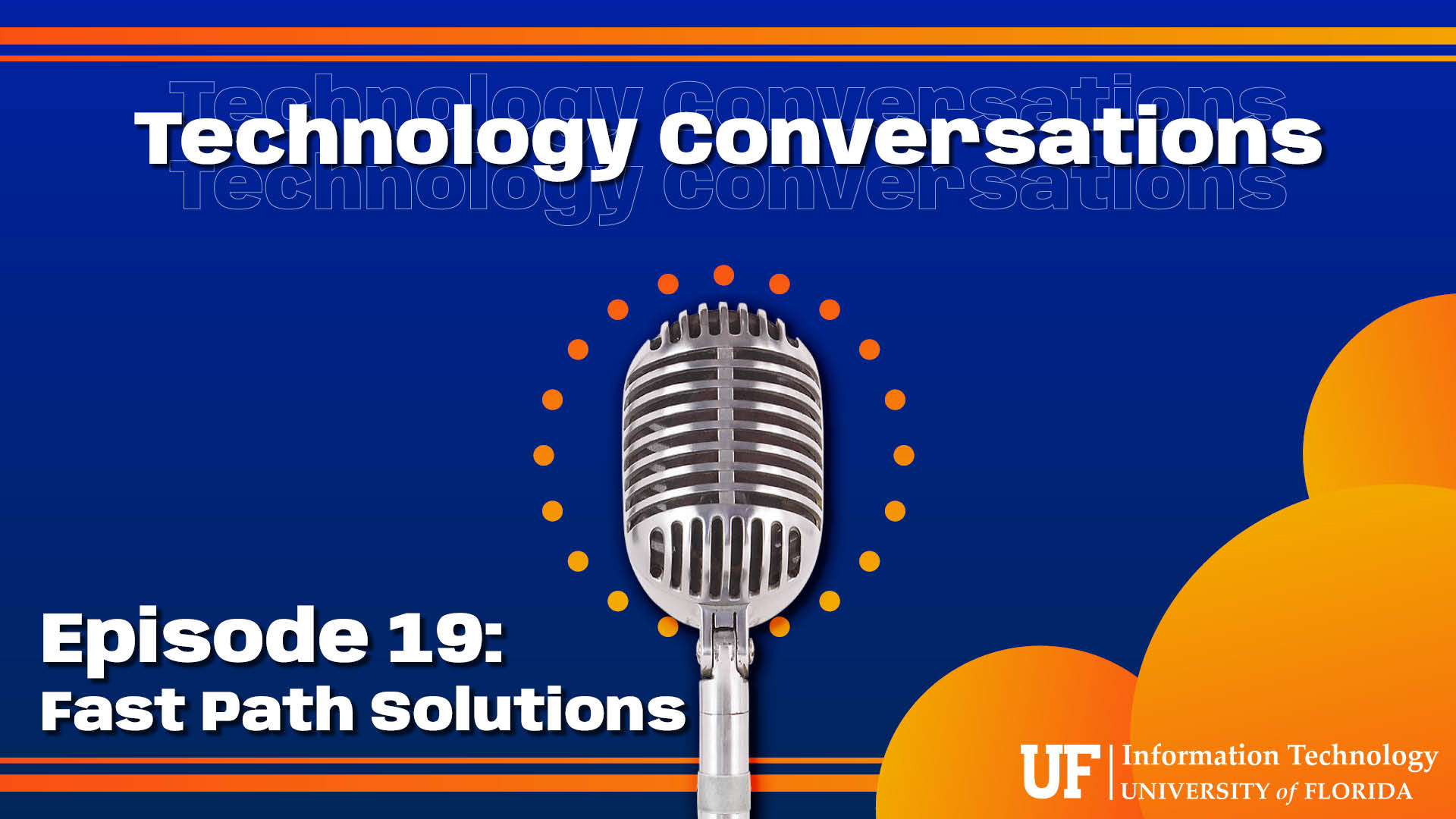“Ask a UFIT Trainer” 1:1 Consultation
Having problems with Zoom, Microsoft Teams, NaviGator Chat, Microsoft Copilot, Qualtrics, SPSS, R Programming, or other technology tools? We are here to help! Reach out to one of our trainers for a one-on-one consultation.
Upcoming Events
Podcast: Technology Conversations
Welcome to Technology Conversations, brought to you by the IT Training team, Center for Instructional Technology and Training (CITT). Here you will hear conversations from IT experts in different fields as well as discussions on how technology plays a key role in individuals’ personal and professional lives.
Episode 19: Fast Path Solutions
Learn about UF's Fast Path Solutions from Stephanie Koberlein, Integrated Risk Management (IRM) Team Lead. You will discover how Fast Path helps streamline technology adoption and why understanding data classifications through the UF Data Guide is critical for protecting sensitive information.
Anchalee Phataralaoha: Welcome to our technology conversations podcast, where we discuss technology related topics from how to find resources for your technology needs to how technology can impact our lives. This is your host Anchalee Phataralaoha.
Today we have Stephanie Koberlein, an IRM or Integrated Risk Management Program Management Team Lead with UFIT Information Security. Welcome Stephanie.
Stephanie Koberlein: Thank you, thank you for having me.
Anchalee Phataralaoha: And to start off could you please introduce yourself and share a bit about your background?
Stephanie Koberlein: Yes, my name is Stephanie Koberlein. I am the Integrated Risk Management Team Lead. I began my journey at UF in 2017 as an OPS employee in the Information Security Office. At that time, I had very little technical or computer background. My experience was primarily in customer service, which is quite a shift from the world of cyber security.
Anchalee Phataralaoha: Did you work in security before you came to UF?
Stephanie Koberlein: I did not. I worked in retail, so very different than what I'm doing now.
Anchalee Phataralaoha: But I guess the skills and knowledge, kind of transferable, right, to your current position?
Stephanie Koberlein: Yeah, absolutely. I'm still primarily dealing with customers on a customer -facing basis, yes.
Anchalee Phataralaoha: So what do you do in general in your position?
Stephanie Koberlein: Yeah, so as the Team Lead for the Integrated Risk Management Program, I lead a small team that's responsible for overseeing IT commodity approvals, managing the UF Data Guide and maintaining the Fast Path Solutions catalog. And the Fast Path solutions are a key resource that streamlines the adoption of pre-assessed technologies across the institution.
Anchalee Phataralaoha: So why would people need to use Fast Path? What is it all about?
Stephanie Koberlein: Yeah, so Fast Path is a curated catalog of pre-assessed software and computing environments. We currently have over 600 items. I believe we have 630 to be exact. And by using these pre-assessed solutions, it streamlines the process significantly. If you select one of the fast path solutions and follow the established guidelines, a risk request is not required. So you can proceed with using the software immediately without delay. And you can also save money, which is great.
Anchalee Phataralaoha: So let's say if someone, you know, they search for an application or software and they find something that fits their need and they just want to grab and use it and they should not do that. Is that so?
Stephanie Koberlein: So if it's on a fast path list and they see it and they're like, oh, great, it says it's pre-assessed, no action required with open data or sensitive data for that product, they can absolutely just grab it and go ahead and move forward with it with no action required. Yes.
Anchalee Phataralaoha: If they do not find the software that they want to use on the list, what should they do?
Stephanie Koberlein: They should reach out to their ISM or Information Security Manager and talk to them about what it is they’re trying to do and they will be able to assist them with finding the right software.
Anchalee Phataralaoha: And how do they find that person?
Stephanie Koberlein: So we do have a Find My ISM link on the security website, and they're also welcome to email us at irm-uf@ufl.edu, and we will be more than happy to assist them with finding their ISM.
Anchalee Phataralaoha: What is the security website?
Stephanie Koberlein: Yeah, it's it.ufl.edu/security.
Anchalee Phataralaoha: Why do people cannot just go grab any software that they find and use it?
Stephanie Koberlein: Yeah, so, you know, using software can be risky because it might have problems, you know, such as vulnerabilities that hackers can take advantage of. They use these weaknesses to steal personal information, break into systems, or install harmful, you know, programs like viruses. The danger is even greater if the software is old, no longer supported, or hasn't been updated. So that's why it's just really important to, you know, use these pre-assess software because we've already done the review on these products and we know that these solutions are safe.
Anchalee Phataralaoha: How do people use Fast Path?
Stephanie Koberlein: Yeah, so how to use it? So you can access the Fast Path Solutions list by going to irm.ufl.edu and selecting Fast Path Solutions. That will present you with a list, and there will be a list of 630 items, and you can search by category, search by name, and it will give you the parameters, the links, everything that is needed there.
So we are in the process of revamping our IRM process with the IRM 2.0 right now. So going forward, everything will need to go through their ISM. There will be a portal. Their ISM will meet with them and discuss their needs. Each request is very different. So the timeframe really is just going to depend on what they're doing, what they're using, the storage, the data, et cetera.
Anchalee Phataralaoha: Okay, so there's no, like, fixed time. It depends on the software and other factors.
Stephanie Koberlein: And that really pushed the pre-assessed solutions because that just exponentially speeds the process up.
Anchalee Phataralaoha: Okay. And if they have any questions, who should they reach out?
Stephanie Koberlein: Yeah. So if they have any questions about Fast Path, the Data Guide, anything in general, please email us at irm-uf@ufl.edu or call 352-294-3589 and someone from my team is happy to assist.
Anchalee Phataralaoha: Ok, sounds good. Any final thoughts?
Stephanie Koberlein: So I just want to reiterate when it comes to cybersecurity and data, ignoring the risk can cost a lot more than just convenience. That is why it’s really important to use these pre-assessed solutions and understand your data. We have the UF Data Guide. UF Data Guide is a tool to help you make informed decisions on where to safely store, analyze, and share data. It also talks about what open data, sensitive data, restricted data is. It provides examples of each one of those along with tools that you can use with each one of those. Those are called Restricted Data Solutions. So I encourage everyone to please check out the UF Data Guide and reach out to our team if we can do anything to assist you in that process.
Anchalee Phataralaoha: Alright. So security is everyone’s responsibility, right? So it’s better to be safe than sorry. That is for sure.
Stephanie Koberlein: Absolutely and we are here to do whatever we can to help you in that process.
Anchalee Phataralaoha: Alright. Thank you very much Stephanie for sharing all those resources.
Stephanie Koberlein: Thank you for having me.
Anchalee Phataralaoha: And that's it everyone. We will see you next time for a topic of interest in IT.
Trending Skills and Topics
UFIT Training provides training for many IT skills. See what’s trending:

